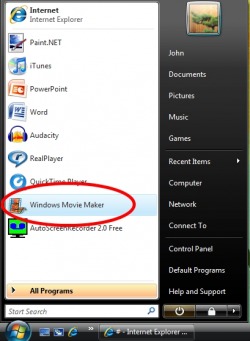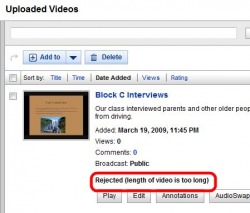 After a lot of angst and near-heartbreak, the final projects for the Car Unit are done! (Well, as done as they are going to be; as always, there are a few students who did not complete the project, but overall this one is in the bag.)
Ultimately, in spite of a lot of mid-project frustration, the final product was pretty satisfying. Many of the students put some real work into these interviews and we got some great stories.
 A brief overview:
This was the final project for a new interdisciplinary unit my team tried out with this year's 8th grade. The topic of the unit was "Cars" and the theme was "Responsibility". In each of the four core curriculum areas, we used automobiles as a platform to address certain core ideas. In my class (Social Studies), we looked at the history of horse manure in America and how cars were seen as a giant leap forward in social responsibility early in the 20th Century. We looked at Henry Ford and how he changed the face of American Labor and we looked at some of the social changes brought about by car culture.
For their final project in Social Studies, students were told to interview someone over the age of 35 about a lesson that they had learned in Responsibility from cars or driving. Students were given bonus points for each year over the age of 65 their interviewees were. [The goal was to encourage them to go out into the community and learn something from the older residents. Most interviewed their parents, though.]
When they had recorded their interviews the students edited them to around two minutes in length and made a one-slide PowerPoint presentation identifying who the interviewee was, what the essential lesson of Responsibility they took away from the interview was and including a relavent picture (with sources cited).
I took the individual slides and sound files and combined them into longer PowerPoint presentations that we watched in class. We went over each project according to the rubric the class had been given at the beginning of the project and the students participated in my grading of the project.
 Once I had four complete PowerPoint presentations (one for each class), I tried to publish them online, so parents and a larger audience could view them. I did this in two ways:
I downloaded a freeware application called iSpring Converter that adds a tab to your PowerPoint menu bar that allows you to more-or-less instantly convert a PowerPoint slideshow into a flash animation movie that you can post on your website. This turned out to be really easy. It will allow us to post the projects directly on the DCS website and the quality of each movie is really good.
 The next step was a little trickier.
I used another freeware program called AutoScreenRecorder to record each PowerPoint as it ran in real time, then used Windows Movie Maker to edit it and add the students' soundfiles to it. (I'll go into this in greater detail in a later post.)
This is not a big deal - I learned how to do all this last year on another student project. The bigger problem surfaced when I tried to post these movies online.
 In the past, I've published videos of student work to TeacherTube, basically a school-safe version of YouTube. Unfortunately, this time around, there was some sort of glitch in the system. I uploaded one of the videos at school and the website said to hold on, this might take a few minutes, etc..., and after an hour or so, SOMETHING got uploaded to my TeacherTube account, but it wouldn't play and I kept getting odd error messages. I assumed this was a problem of our school's filter or of TeacherTube itself, so after trying again at home, I decided to upload the student movies to YouTube. I figured that it would carry a little more prestige with the students anyway.
My videos uploaded pretty well, but somehow were never ready to play. Finally, this morning, I looked at my YouTube account more closely and realized that - duh - the videos were way too long for YouTube, which does, after all, specialize in short video clips of beer commercials and waterskiing squirrels. (I say this with all the affection in the world. You know at this point the special place YouTube holds in my heart.)
Finally, I ended up uploading the videos to Vimeo, a different online video service, which seems to suit our needs for this particular project better.
Anyway, without any further ado, here are the 2009 student Car Projects:

Overall, I would classify this project as a qualified success. I will definitely try it again with next year's class.
Click here to view the New Hampshire State Department of Education Social Studies Frameworks standards adressed by the Car Unit.
I'm driving myself crazy. And to understand why, you have to know something about how I go about home-improvement projects:
[Please bear with me - this really is going somewhere.]
Before and during any new home-improvement project - putting up a fence, tiling a floor, ect... - I get totally obsessed. I think constantly about the step-by-step process of prepping the walls, digging post holes or taping off trim with blue painter's tape. I'll wake up out of a sound sleep, sit bolt-upright in bed and say, "Drop cloths! I need more drop cloths!"
(At which point, my wife will mutter something about having to work in the morning and roll over in a huff. She really should have thought things through more carefully before marrying me.)
I think the problem comes from the fact that almost everything I try is a bit of a fiasco the first time around. That's one thing when I'm trying a new recipe, but when we're talking about making some permenant change to the house we live in, I'm hesitant to inflict a botched job on my family. (Not to mention our poor house itself - hasn't it been through enough already?)
Now, take that attitude and translate it to the classroom. (Did you just shudder a little? I did.)
This past month, I tried a new project with my students. Because it is the first time I've ever done this project, I did not expect perfection, but things have... well, they haven't quite turned out... um,...
Okay, it seems that there's no delicate, understated, British-sounding way to put this - this project has bitten the big, rotten radish of sucky-ness and spit it out into the trashcan of dispair.
A little background:
This year's 8th Grade class is a particularly challenging one. Individually, they are great kids, but collectively, they are an insanely frustrating group of students. They generally don't listen, follow directions, meet deadlines or do any challenging work. Faced with bad grades in the face of lack of effort, a lot of them will shrug and say, "Whatever, Dude... I'll take the zero."
[Let me reiterate: Each of these students is a really great kid. It's easy to forget that when talking about their frustrating group dynamic. Each of them deserves quality teaching from me, no matter what that takes.]
So I've been working really hard to think outside of the box and come up with projects and activities that frame material in a non-traditional way. I want to engage them and get them to invest themselves in what we're doing in class. This latest project is my most recent stab at that.
We just wrapped up a multi-disciplinary unit with the topic of Cars. The thought was that this was something that would engage them - particularly the boys - and would lend itself to an interdisciplinary approach. I would cover the history of cars in America, my Math colleague would teach them about calculating interest rates, our Science teacher would work with them on calculating their carbon footprint and in Literacy, they would learn a bit about media literacy and how to read a commercial.
So far, so good.
In addition, the theme of the unit was Responsibility. In each class, we'd touch on how responsible behavior is totally tied up in every aspect of car use and ownership.
Again, sounds good.
The actual lessons in the unit worked out awfully well. I came up with a good PowerPoint to kick off the unit, then spent a couple of days teaching them about the impact of horse manure on American cities and how by 1920 or so, buying a car was seen as an incredibly responsible act - both socially and ecologically. (Nobody ever imagined what it would be like once we had 300 million of them on the road.) I had a load of horse manure delivered to the back parking lot at school, which we went out and inspected in WAY more detail than the students really wanted to. I brought in a large animal veterinarian with parasites in jars to talk about horse poop in detail and what the daily life of urban draft horses would have been like. I presented a couple of lessons on Henry Ford and how he changed Labor in America. We discussed the ways that cars changed society and how each of those changes brought its own load of responsibility with it.
At this point, I was feeling pretty good; in retrospect, probably over-confident.
For their final project for this unit in Social Studies, I showed the students a PowerPoint with stories from the StoryCorps project. Their assignment was to record a StoryCorps-style interview with an adult about a lesson in responsibility they had learned from driving or being in a car. I told them that their interviewee had to be at least 35 years old and I gave them bonus points if he or she was older than 65. The students were supposed to record the interview, edit the soundfile to about two minutes, save it in their folder on the school server and put together a one-slide PowerPoint presentation about who the person they'd interview was and what they had learned about Responsibility from the interview. (The idea being that I would combine them into one large presentation afterward.) I let students sign out MP3 players to record the interview and I gave them two days of class time with computers to do the work. At the end of that time, a lot of students said they needed more time, so I extended the deadline for another three days and made myself and the computers available after school.
The students wrote the rubric for this project down in class. The instructions for saving and naming their work were posted on the board and I went over the directions verbally at the beginning and end of each class period.
Almost none of the students followed the directions.
Pretty much all of them went out and got the interview. I thought that would be the hard part, but they were very excited about that. The problem was that they saved their work in folders on individual computers or in different folders on the server. They did not name their files the way I had asked them to. When they saved their soundfiles in Audacity, they "saved" them, instead of exporting them. (A natural mistake, but again, we went over this EVERY class!) Some of them didn't make a slide at all and the ones who did, did not follow the rubric that they had written down.
As a result - if I were to grade them today - almost half of my students have failed this project. In one of my classes, only ONE student followed directions!
So this is where I'm at right now:
I'm very frustrated and angry with myself. I had really high hopes for this project and it's really heartbreaking to see it fizzle out like this. Given how badly this group of students follow directions and follow through with things generally, giving them another extension to finish this project feels like coddling them, enabling their work-ethic issues and setting them up for failure next year in high school. It's very tempting to blame them for what's happened.
On the other hand, numbers don't lie. If the majority of students failed to follow directions, there has to have been something wrong with the directions. The fault has to lie largely with me. That's very frustrating. These guys really need me to come through for them - more than most classes - and I seem to have let them down.
So what to do...
Looking back on it, I realize that I probably should have given them a checklist with the project requirements on it to check off as they got to each stage of the project. I made one up for next year's group while this was all fresh in my mind, so, I think I'll give this group a copy of that checklist next Monday. I'll explain the situation and give them an additional two days to change file names, rewrite slides and save things to the correct folders, checking themselves off on the list as they go, then I'll grade the work on Wednesday.
So, I guess the lesson to take away from all this is...
Um...
Well, I think my inabillity to identify the lesson here is one of the reasons I find myself in this position to begin with.
Teaching is not for the weak, is it?
If you've read this far, you are a very kind and patient person. Thank you. If you have any comments or suggestions, I'd love to hear them. If you can identify the lesson I should be picking up here, I'd be doubly grateful. If you can think of a way to motivate and connect with these students, I'll make you any PowerPoint of your choice - maybe for life!
|






 RSS Feed
RSS Feed